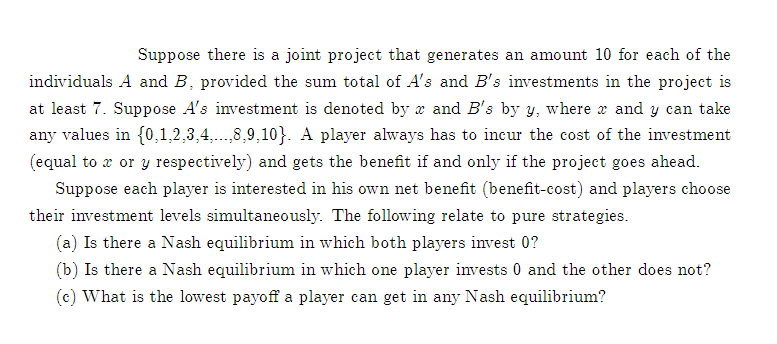Suppose there is a joint project that generates an amount 10 for each of the individuals A and B, provided the sum total of A's and B's investments in the project is at least 7. Suppose A's investment is denoted by x and B's by y, where r and y can take any values in {0,1,2,3,4..8,9,10}. A player always has to incur the cost of the investment (equal to æ or y respectively) and gets the benefit if and only if the project goes ahead. Suppose each player is interested in his own net benefit (benefit-cost) and players choose their investment levels simultaneously. The following relate to pure strategies. (a) Is there a Nash equilibrium in which both players invest 0? (b) Is there a Nash equilibrium in which one player invests 0 and the other does not? (c) What is the lowest payoff a player can get in any Nash equilibrium?
Suppose there is a joint project that generates an amount 10 for each of the individuals A and B, provided the sum total of A's and B's investments in the project is at least 7. Suppose A's investment is denoted by x and B's by y, where r and y can take any values in {0,1,2,3,4..8,9,10}. A player always has to incur the cost of the investment (equal to æ or y respectively) and gets the benefit if and only if the project goes ahead. Suppose each player is interested in his own net benefit (benefit-cost) and players choose their investment levels simultaneously. The following relate to pure strategies. (a) Is there a Nash equilibrium in which both players invest 0? (b) Is there a Nash equilibrium in which one player invests 0 and the other does not? (c) What is the lowest payoff a player can get in any Nash equilibrium?
Managerial Economics: Applications, Strategies and Tactics (MindTap Course List)
14th Edition
ISBN:9781305506381
Author:James R. McGuigan, R. Charles Moyer, Frederick H.deB. Harris
Publisher:James R. McGuigan, R. Charles Moyer, Frederick H.deB. Harris
Chapter1: Introduction And Goals Of The Firm
Section: Chapter Questions
Problem 4E: In the Southern Company Managerial Challenge, which alternative for complying with the Clean Air Act...
Related questions
Question

Transcribed Image Text:Suppose there is a joint project that generates an amount 10 for each of the
individuals A and B, provided the sum total of A's and B's investments in the project is
at least 7. Suppose A's investment is denoted by x and B's by y, where r and y can take
any values in {0,1,2,3,4..8,9,10}. A player always has to incur the cost of the investment
(equal to æ or y respectively) and gets the benefit if and only if the project goes ahead.
Suppose each player is interested in his own net benefit (benefit-cost) and players choose
their investment levels simultaneously. The following relate to pure strategies.
(a) Is there a Nash equilibrium in which both players invest 0?
(b) Is there a Nash equilibrium in which one player invests 0 and the other does not?
(c) What is the lowest payoff a player can get in any Nash equilibrium?
Expert Solution
This question has been solved!
Explore an expertly crafted, step-by-step solution for a thorough understanding of key concepts.
Step by step
Solved in 4 steps

Recommended textbooks for you

Managerial Economics: Applications, Strategies an…
Economics
ISBN:
9781305506381
Author:
James R. McGuigan, R. Charles Moyer, Frederick H.deB. Harris
Publisher:
Cengage Learning

Managerial Economics: A Problem Solving Approach
Economics
ISBN:
9781337106665
Author:
Luke M. Froeb, Brian T. McCann, Michael R. Ward, Mike Shor
Publisher:
Cengage Learning

Managerial Economics: Applications, Strategies an…
Economics
ISBN:
9781305506381
Author:
James R. McGuigan, R. Charles Moyer, Frederick H.deB. Harris
Publisher:
Cengage Learning

Managerial Economics: A Problem Solving Approach
Economics
ISBN:
9781337106665
Author:
Luke M. Froeb, Brian T. McCann, Michael R. Ward, Mike Shor
Publisher:
Cengage Learning